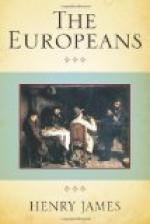“I don’t know. I thought you would melt away.”
“That ’s a compliment to my solidity! I melt very often,” said Felix, “but there is always something left of me.”
“I came and waited for you by the door, because the others did,” Gertrude went on. “But if you had never appeared I should not have been surprised.”
“I hope,” declared Felix, looking at her, “that you would have been disappointed.”
She looked at him a little, and shook her head. “No—no!”
“Ah, par exemple!” cried the young man. “You deserve that I should never leave you.”
Going into the parlor they found Mr. Wentworth performing introductions. A young man was standing before the Baroness, blushing a good deal, laughing a little, and shifting his weight from one foot to the other—a slim, mild-faced young man, with neatly-arranged features, like those of Mr. Wentworth. Two other gentlemen, behind him, had risen from their seats, and a little apart, near one of the windows, stood a remarkably pretty young girl. The young girl was knitting a stocking; but, while her fingers quickly moved, she looked with wide, brilliant eyes at the Baroness.
“And what is your son’s name?” said Eugenia, smiling at the young man.
“My name is Clifford Wentworth, ma’am,” he said in a tremulous voice.
“Why did n’t you come out to meet me, Mr. Clifford Wentworth?” the Baroness demanded, with her beautiful smile.
“I did n’t think you would want me,” said the young man, slowly sidling about.
“One always wants a beau cousin,—if one has one! But if you are very nice to me in future I won’t remember it against you.” And Madame M; auunster transferred her smile to the other persons present. It rested first upon the candid countenance and long-skirted figure of Mr. Brand, whose eyes were intently fixed upon Mr. Wentworth, as if to beg him not to prolong an anomalous situation. Mr. Wentworth pronounced his name. Eugenia gave him a very charming glance, and then looked at the other gentleman.
This latter personage was a man of rather less than the usual stature and the usual weight, with a quick, observant, agreeable dark eye, a small quantity of thin dark hair, and a small mustache. He had been standing with his hands in his pockets; and when Eugenia looked at him he took them out. But he did not, like Mr. Brand, look evasively and urgently at their host. He met Eugenia’s eyes; he appeared to appreciate the privilege of meeting them. Madame Munster instantly felt that he was, intrinsically, the most important person present. She was not unconscious that this impression was in some degree manifested in the little sympathetic nod with which she acknowledged Mr. Wentworth’s announcement, “My cousin, Mr. Acton!”
“Your cousin—not mine?” said the Baroness.
“It only depends upon you,” Mr. Acton declared, laughing.
The Baroness looked at him a moment, and noticed that he had very white teeth. “Let it depend upon your behavior,” she said. “I think I had better wait. I have cousins enough. Unless I can also claim relationship,” she added, “with that charming young lady,” and she pointed to the young girl at the window.




